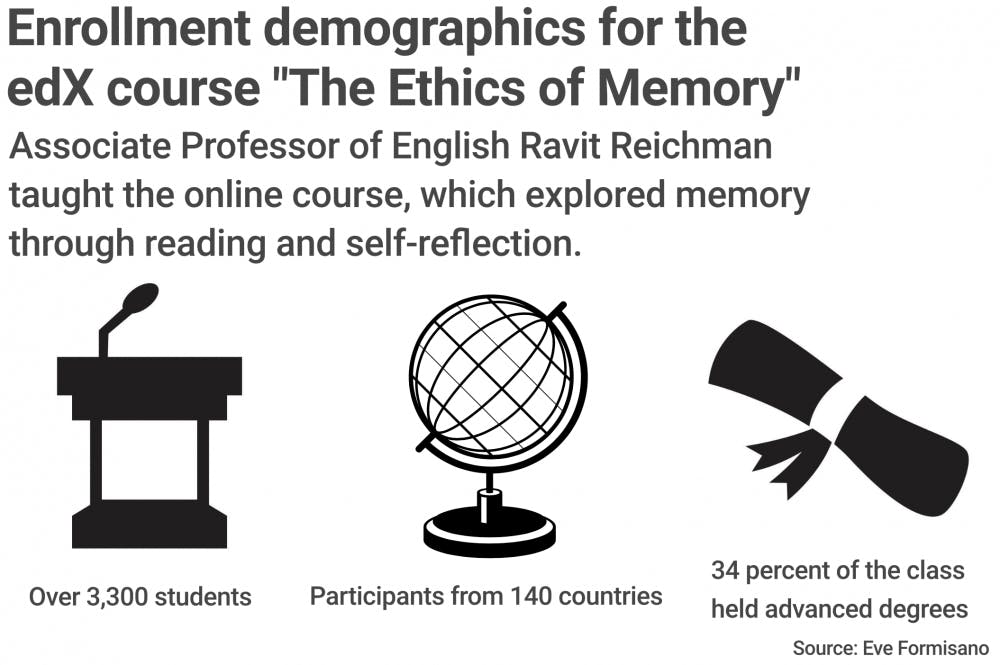Students across the world began traveling through mythical literary realms to explore various facets of humanity Tuesday, assisted in their quest by virtual guide Leila and a computer generated likeness of James Egan, professor of English and interim director of the John Nicholas Brown Center for Public Humanities and Cultural Heritage. Students who enrolled in the free online University course “Fantastic Places, Unhuman Humans: Exploring Humanity through Literature” have access to this virtual world through the online educational platform edX.
The University partnered with edX in May 2017 to expand its global reach and to further engage students, alumni and families that make up the Brown community, said Eve Formisano, director of strategic initiatives for the School of Professional Studies. edX, founded by Harvard and the Massachusetts Institute of Technology in 2012, offers free online courses to its user base of over 14 million students, Formisano said. Users can also pay a $49 fee to receive a verified certificate upon the completion of a course.
In summer 2017, the University ran its first two BrownX courses in collaboration with edX: “The Ethics of Memory,” a literary course exploring memory through reading and self-reflection, and “Artful Medicine: Art’s Power to Enrich Patient Care,” a medical humanities class that examines how the medical community harnesses the power of art and empathy to improve patient care. Nearly 5,000 students ages 14 to 93 from an array of countries have taken advantage of the University’s partnership with edX, Formisano said.
The University is contractually obliged to produce at least 12 courses in the first three years of the partnership with edX, said Larry Bouthillier, senior director of Digital Learning Initiatives. “A lot of work goes into creating these courses. We have the technical ability to turn out a lot of them, but it will be costly,” he added. The University does not yet know the cost of creating these courses but hopes to craft a budget for the program in the coming weeks, he said.
A small number of edX partners are generating revenue from online courses, but most institutions are “lucky just to break even,” Bouthillier said. “Revenue is a last thought,” he added. Instead, the University primarily hopes that the partnership will provide the opportunity to experiment with different types of learning platforms.
To design a new course, a professor must partner with course designers on the online learning and innovation team. The new “Fantastic Places” course is more of a collaboration with the course’s instructional designer, Naomi Pariseault, than it is his own teaching, Egan said. In the design process, Egan met with Pariseault weekly to discuss assignments and course learning goals.
“This is one of those dream projects that you always wanted to work on and still can’t believe you got the chance to do so,” Pariseault said. Her team is responsible for creating all of the online courses offered by the University through edX and other platforms, as well as other digital learning initiatives like the FirstYear@Brown online orientation for incoming undergraduates that began this year.
Designing an online course “seemed like a really interesting pedagogical challenge,” Egan said. Through his course, he has created content that will equally engage the attention of a 15-year-old and a 70-year-old student, he added. Egan has already taught an online-only class for Brown students and expects that his edX teaching experience “will be a little bizarre,” he said.
“It doesn’t feel like teaching to me,” Egan said, adding that hearing students’ laughter and answering their questions in the moment is a major benefit of in-classroom teaching.
Unlike Egan, Fred Schiffman, vice chairman of medicine for the Alpert Medical School, was new to online learning when he began teaching “Artful Medicine” in July. He credits the ease of transitioning from in-classroom to virtual platforms to John de Szendeffy, his instructional course designer. Before this experience, Schiffman felt as though his teaching skills were dependent on the connections he made with people in the classroom.
Once he started teaching the course, Schiffman’s worries faded. “I was able to connect with people all over the world … People opened themselves up in a way that was astonishing,” he said, adding that even virtually, his students were willing to share their personal experiences with medicine.
The next few courses will include offerings that tackle cybersecurity and medical humanities, Formisano said. The University would also like to experiment with more rigorous courses because the three-week classes offered thus far have been more aligned with “personal interest” rather than graduate level learning, Bouthillier said.





